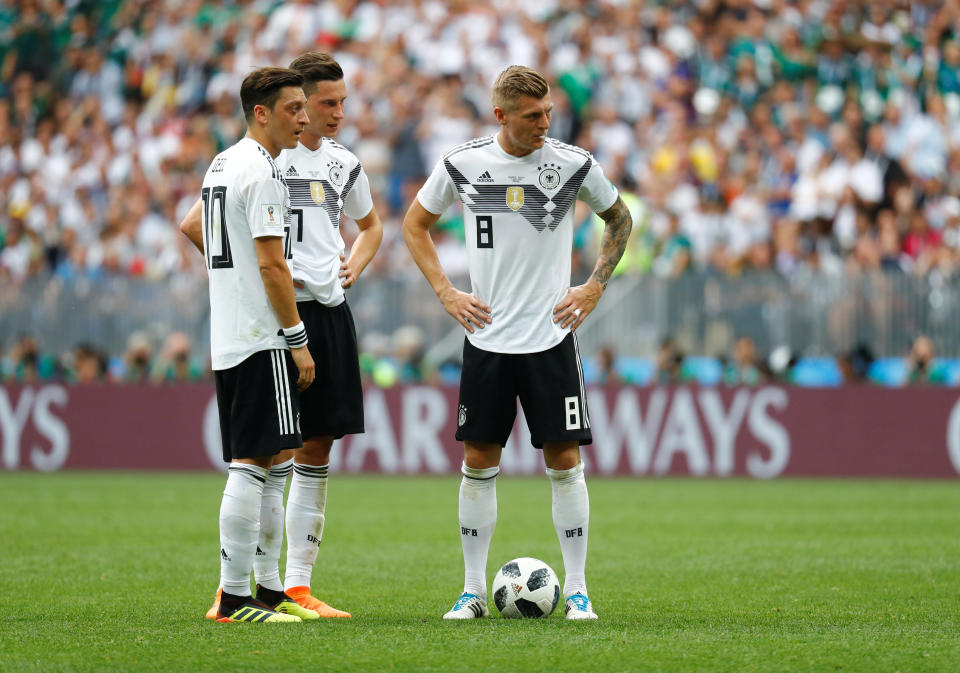Biggest World Cup story so far? The slow start by most of the big teams
As far as these things go, we’re off to an uneventful start to this World Cup. None of the fears about hooliganism, racism or any of the other issues endemic to Russian soccer have manifested. It’s all been quite pleasant. The games have been competitive and fun.
But the biggest things to have happened just aren’t all that notable, in the grand scheme of things. The Mexican fans caused a minor earthquake at home with their celebrations of the goal that would fell mighty Germany. Croatia sent forward Nikola Kalinic home for refusing to come on as a substitute against Nigeria. Denmark lost midfielder William Kvist to two broken ribs and a punctured lung against Peru, even though he hopes to return in this tournament. And the English have been beset by both bugs and insomnia, having made their base camp so far north that there’s only about 3 hours of night-time there.
Ho-hum.
While the World Cup is, in some fairly large measure, a geopolitical exercise, the story so far has actually been the soccer down on the field. And that’s both unusual and refreshing. The main story-line to emerge is that of struggling juggernauts.
In largely tense games – eight of the 11 games that didn’t end in a tie were won by a single goal – the pre-tournament favorites and outsiders have largely gotten off to sputtering starts.

Spain, rocked by the World Cup-eve dismissal of its manager, should probably have beaten an experienced but very much inferior Portuguese side – in spite of its status as defending European champions – whether it had Cristiano Ronaldo or not. Instead, it made atypical mistakes and struggled to command the game, dropping points in a 3-3 tie.
France only managed to beat a weak Australia side 2-1 thanks to a VAR-assisted penalty and an own goal awarded by goal-line technology that crossed the line by no more than an inch. Les Blues had a hard time of breaking down the Socceroos and its much-hyped attack never really got going.
Against a stout Icelandic defense, Argentina dominated but had trouble puncturing enough holes to get opportunities. In fact, in spite of commanding a towering 78 percent of possession, the 1-1 tie was really quite equitable. It didn’t help, of course, that Lionel Messi missed a penalty yet again.
The defending champions from Germany were caught entirely off-guard by Mexico manager Juan Carlos Osorio’s abandonment of his team’s typical press-and-possess style in favor of an approach of absorbing and countering into the space behind Die Mannschaft’s midfield. While Germany spent most of the second half in Mexico’s half, El Tri might well have won by more than the 1-0 upset.
Brazil, meanwhile, didn’t do enough to vanquish an underrated but beatable Swiss team, settling for a 1-1 tie. In moments, the five-time champions showed off their ample attacking talents, but they didn’t do nearly enough to win convincingly, or win at all. They, too, have a lot of sharpening of their tools left to do as the tournament progresses.

Only Belgium had a convincing opening bout. And even the Red Devils needed more than an hour to break the resistance of puny Panama, which made its World Cup debut and is labeled one of the weakest teams in Russia by some. It took a pair of wonder goals to set the Belgians on their way to a 3-0 victory.
Finally, England needed an injury-time Harry Kane winner to vanquish Tunisia 2-1. While the Three Lions produced lots of chances and seem to have held up well under the eternal pressure put on them, the sheer bulk of opportunities missed turned what should have been a walkover into a tense affair.
To sum up, favorites Spain, Germany and Brazil combined for just two points. While secondary challengers France, Argentina and Belgium mustered only one victory that felt comfortable. And wherever England falls in your view of things, their opener wasn’t nearly as straightforward as it should have been.
So what to make of all that? Four years ago, Argentina, Brazil and Germany all won their openers. Of the favorites back then, only the Spanish made a false start – in a disheveling 5-1 loss to the Netherlands foreboding a group-stage exit. But make it to the final and the World Cup is a long tournament. It takes seven games to win the thing, leaving plenty of time to grow into form, provided you don’t make an ill-timed stumble along the way.
You rarely see a team roaring out of the gate and sustaining that form all the way through to the final. If anything, the quick starters tend to fizzle and the eventual champion is a team that managed to scale up its performance one game at a time. And to be sure, none of the big teams are in trouble yet, as far as advancing to the round-of-16 is concerned. Two-thirds of the group stage remains to be played, after all.
At worst, Germany might now finish behind Mexico in Group F. And assuming Brazil still claims Group E, that could mean a rematch of the 2014 semifinals, the instantly famous 7-1 drubbing of the home team on Die Mannschaft’s way to the title. Both teams would like to avoid such an early meeting. But that fate might yet be avoided. It’s just too soon to tell.
There are no crises in Russia yet. Just a series of unusual results.
This World Cup has yet to really get started.
Leander Schaerlaeckens is a Yahoo Sports soccer columnist and a sports communication lecturer at Marist College. Follow him on Twitter @LeanderAlphabet.
More World Cup on Yahoo Sports:
• Is it time for Germany to panic after World Cup upset?
• Neymar, Brazil sleepwalk through opener against Switzerland
• Mexicans celebrate Germany upset with tears, marriage proposals
• Bugs swarm field in Russia before England-Tunisia match


